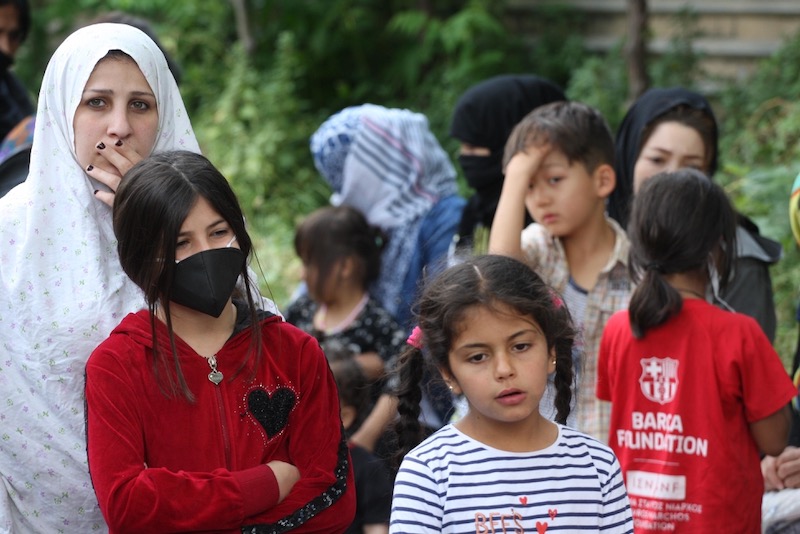Imagine the unease felt by a mother cooped up with her children in a single room. Cooking, studying, washing – in a single room. Outside, the heat is stifling, the air thick with rotting garbage. There is no clean water and little food, if any.
This is the situation for many refugee women, my fellow Syrians, who now face a devastating future without the work they need to feed their families.
And they are the reason why, when asked if we are going to stop our coronavirus resilience campaign due to lockdown lifting, I tell the truth: we need this campaign now more than ever.
Even before the pandemic, Lebanon was facing economic collapse. The World Bank predicted that 40 per cent of Lebanese people would fall below the poverty line this year. Covid-19 has swept so many more people towards that fate.
I helped set up Shatila Studio to create a safe space for Syrian refugees and their host communities, to provide women with skills to build incomes to support their families, so they don’t have to rely on hand-outs. It became a place of sunlight and hope for the hundred women who work there.
Before the Covid-19 outbreak, the women at the studio were focused on creating embroidery and were paid by the piece. In our wider projects, we were working on opening a new school, providing developmental programmes and psychosocial support.
That all came to a halt. Almost overnight, the silent catastrophe of Covid-19 on vulnerable families meant we had to turn our attention to operating in emergency crisis mode.
We moved our production from embroidery to producing washable, reusable facemasks. The masks, which are selling very well, ensured that we could sustain the women’s salaries during the lockdown period.
For each item sold, one mask is donated to someone who cannot afford one. By doing this, we hoped to help to minimise the shortage in medical facemasks on the Lebanese market and support the local community.
I currently manage the projects from my home in Saudi Arabia, where I moved for my husband’s work. Before lockdown, I travelled to Lebanon monthly, to be with family and to visit the projects, and had an international speaking tour planned. This was all cancelled.
Being in my line of work, routine, systems, and processes are vital to support the most vulnerable. This, however, comes at the sacrifice of your own routine. It is difficult to juggle virtual lessons – with my children, aged eight and ten – alongside fundraising and calls with donors.
However, when I am struggling, I think back to my visits to the Shatila refugee camp, where Shatila Studio is based.
The area is a place of wonder. Formed in 1949, it was initially a Palestinian refugee camp, home to around 20,000 inhabitants. Today, it is estimated more than 43,000 people live within the tiny one-kilometre space, with entangled electric wires, slum-like buildings, and tight corridors.
When I meet with the women of Shatila Studio or the children at the B&Z learning centre, I feel their warmth and welcome. I see their eagerness to live and their happiness to be at the community centre, which has become a second home to many.
 Yasmin with a group of Syrian women (Pic: B&Z)
Yasmin with a group of Syrian women (Pic: B&Z)
We don’t know how we will come out of this pandemic. What we do know is that, as we face these challenging times, people need the basics for daily life.
During the pandemic, we worked hard to pivot our programmes to support refugees and their host communities with food baskets and hygiene kits. We also gave cash allowances, for refugees that desperately needed medicines for themselves or family members.
As world economies grapple with the impact of coronavirus, it is getting more difficult to find funding to support our work. Despite this, I remain a very firm believer that when you try to do good, doors and windows open for you.
Now, more than ever, we need to highlight the issues affecting refugee communities. With their voices and ours, we must continue to call for the end to the conflict and must ensure that refugees, especially women, have what they need to restore dignity in their lives.
Yasmin Kayali is co-founder of charity Basmeh and Zeitooneh (B&Z), supported by the UK charity CAFOD. An earlier version of this article appeared in Marie Claire, 16 May 2020.



 Loading ...
Loading ...
What do you think?
You can post as a subscriber user ...
User comments (0)